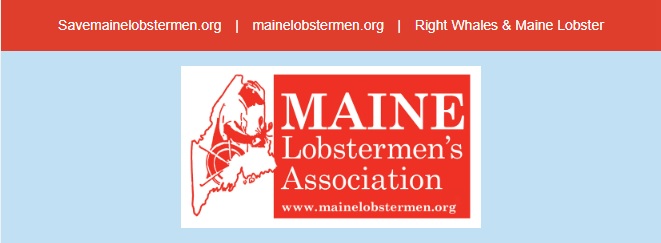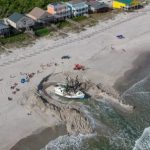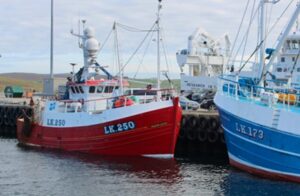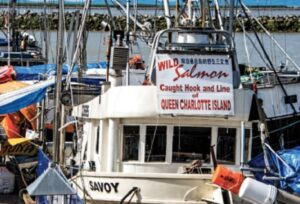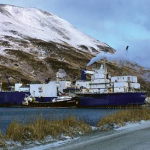Maine Lobstermen’s Association Files Opening Brief in Appeal of Burdensome Federal Regulations
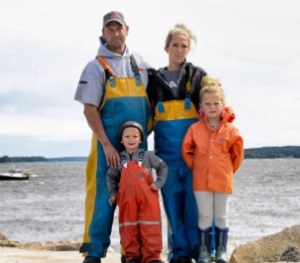 WASHINGTON, D.C. Nov. 10, 2022 – The fight to save Maine’s iconic lobster industry has reached the U.S. Court of Appeals for the D.C. Circuit, as the Maine Lobstermen’s Association (MLA) filed its opening brief in a challenge to the federal regulations poised to crush workaday fishermen.
WASHINGTON, D.C. Nov. 10, 2022 – The fight to save Maine’s iconic lobster industry has reached the U.S. Court of Appeals for the D.C. Circuit, as the Maine Lobstermen’s Association (MLA) filed its opening brief in a challenge to the federal regulations poised to crush workaday fishermen.
The National Marine Fisheries Service (NMFS) is implementing a rule that requires fishermen to reduce the risk of right whale entanglement with lobster gear by 98 percent. The overwhelming majority of Maine lobstermen are unable to afford compliance with the draconian risk reduction plan, that according to the NMFS, will not even recover the whale population. The plan will likely result in a corporate takeover of the remnants of Maine’s fishery, destroying the culture, charm, and most importantly, the families and communities who have responsibly fished Maine lobsters for generations.
“Maine’s lobster industry brings in hundreds of millions of dollars in revenue each year, supports thousands of jobs, and single-handedly sustains dozens of coastal communities in the Nation’s most rural state,” the brief reads. “The Supreme Court has already held—unanimously, no less—that a central purpose of the [Endangered Species Act] provision at issue ‘is to avoid needless economic dislocation produced by agency officials zealously but unintelligently pursuing their environmental objectives.’ This Court should heed that admonition and preserve a national icon.”
The brief explains that the law requires the NMFS to use the best scientific and commercial data available and ensure only that the lobstermen are not likely to jeopardize the right whale population. Instead, the agency skewed the evidence and catastrophized. Regulators relied on worst case scenarios and assumptions unsupported by their own data to impose a risk reduction plan that poses an existential threat to a classic American trade.
There is no physical evidence that Maine’s lobstermen are a threat to right whales. Lobstermen have implemented measures to protect whales from lobster gear for more than two decades. Their safety record is spotless – as the brief notes, there has never been a documented whale fatality due to Maine’s fleet, and the last documented instance of a right whale entanglement involving Maine lobster gear was in 2004, and that entanglement occurred years before lobstermen further enhanced their safety measures and climate change prompted whales to migrate away from Maine waters
See the attached fact sheet for key excerpts from the brief.
Below please find key excerpts from the MLA’s opening brief in the D.C. Circuit.
The government’s response is due on Dec. 20. The PACER case number is 22-5238.
“No legislation, including the ESA, pursues its purposes at all costs. That much is
confirmed by §7(a)(2) of the ESA, which requires federal agencies to review the best
scientific and commercial data and ensure only that their actions are not likely to
jeopardize a listed species—not to place a thumb on the scale ‘in favor of the species’ and
to guard against jeopardy even in the most unlikely of scenarios.” (ps. 27-28)
o “The relevant text of the ESA explains that NMFS must focus on probable
scenarios as revealed by the best available data, not the most improbable
scenarios that emerge after applying a substantive presumption ‘in favor of the
species.’”
o “The agency’s error here is glaring. After all, NMFS concededly never focused
on what would ‘likely’ occur to the right whale if it continued to authorize the
American lobster fishery. Instead, NMFS focused on ‘worst case scenarios’ that
it conceded would ‘very likely’ never occur.” (see p. 35 for citations to NMFS
materials)
“NMFS imposed radical change to existing conservation restrictions on the American
lobster fishery without meaningfully testing their necessity or proportionality as Congress
required.” (p. 45)
o “NMFS simply assumed on the front end of the process that economically
debilitating conservation restrictions on the lobster fishery are necessary and then
generated a biological opinion that did nothing but confirm that those extreme
restrictions—untested for reasonableness or prudence—would not jeopardize the
right whale. That approach makes a mockery of the congressional scheme, as it
allows NMFS to entirely sidestep questions about whether the conservation
framework is necessary to avoid likely jeopardy, a ‘reasonable and prudent
alternative’ or a ‘reasonable and prudent measure.’” (p. 47)
o Just like any administrative agency, NMFS…must point to explicit congressional
authority to justify its conduct. Thus, rather than ask whether any statute limits
NMFS’ authority to include needless and economically ruinous conservation
requirements in its proposed action, the district court should have asked whether
any statute authorized it to do so. No such statute exists.
“Because Maine’s lobster industry (and the entire state) has suffered enough already, the
Court should reverse and simply order a remand to the agency to assess whether
authorizing the American lobster fishery would likely jeopardize the right whale without
speculating about ‘worst case scenarios,’ or putting a thumb on the scale ‘in favor of the
species’ and against the hardworking men and women of Maine’s iconic lobster
industry.” (ps. 53-54)
The district court . . .ruled in NMFS’ favor in the decision below because it believed that
it could sidestep the core legal question and assess only whether NMFS’ “worst case
scenario” approach survives deferential arbitrary-or-capricious review. But assessing
whether agency action is arbitrary or capricious is not the same as considering whether
that action is contrary to law, and the APA imposes a nondiscretionary duty on courts to
resolve questions of law. The court below thus abdicated its judicial duty.” (ps. 25)
The MLA is the oldest and largest fishing-industry association on the east coast and represents approximately 1,000 commercial lobstermen in Maine. It advocates for a sustainable lobster resource and the fishermen and communities who depend on it.
Donate to #SaveMaineLobstermen at: www.savemainelobstermen.org
Contact Info:
Maine Lobstermen’s Association
2 Storer Street, Suite 203, Kennebunk, ME 04043
207.967.4555






